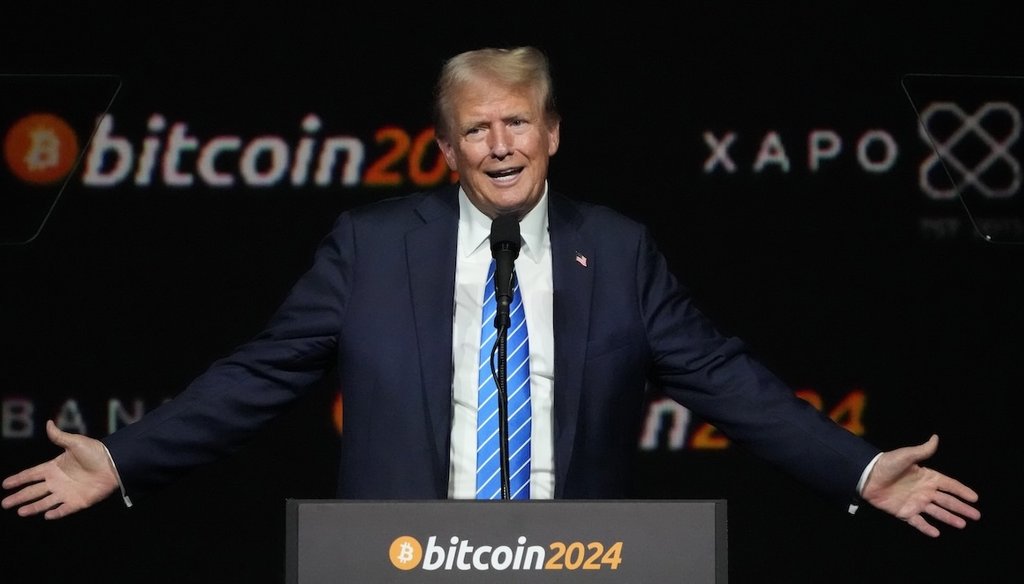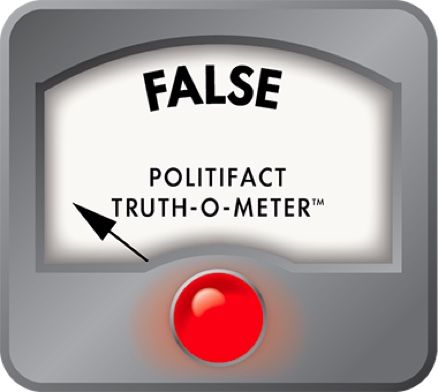Stand up for the facts!
Our only agenda is to publish the truth so you can be an informed participant in democracy.
We need your help.
I would like to contribute

Then-Republican presidential candidate and now President Donald Trump speaks at the Bitcoin 2024 Conference, July 27, 2024, in Nashville, Tenn. (AP)
If Your Time is short
-
In January, President Donald Trump launched a type of cryptocurrency called meme coin, dubbed $Trump, which people anywhere in the world can buy while concealing their identity.
-
Experts told PolitiFact this cryptocurrency could make it possible for people to channel money to Trump beyond legal limits for campaign contributions.
Days before his 2025 inauguration, President Donald Trump announced the launch of his meme coin, a form of cryptocurrency.
Sen. Chris Murphy, D-Conn., recently said it could be used for illicit purposes.
He posted April 9 on X: "The U.S. President is running a backdoor bribery scheme in which any CEO or foreign oligarch can send him money secretly through his crypto coin scam in exchange for favors."
Sen. Bernie Sanders, I-Vt., echoed that idea during an April 9 CNN town hall, saying Trump "makes money by selling coins, crypto coins," and "anybody can contribute, which is a direct line to the president."
Legal experts told PolitiFact it’s possible, but there’s no evidence it has happened.
Sign up for PolitiFact texts
White House spokesperson Anna Kelly told PolitiFact, "The President’s assets are in a trust managed by his children. There are no conflicts of interest." The Washington Post reported after Trump’s 2024 presidential win that, unlike in 2017 when he sold off all his stock before taking office, Trump has not taken action to "avoid financially benefiting from being president." He also owns a multibillion dollar stake in his social media company.
Cryptocurrency is a digital asset with monetary value that can be traded without using an intermediary, such as a bank. It is promoted as an alternative to traditional financial markets. Trump and his family have launched multiple cryptocurrency projects.
Cryptocurrency transactions are validated through blockchain technology, which functions as a ledger that runs on computer servers worldwide. The nature of cryptocurrency allows anonymous investments, so anyone in the world can buy Trump’s cryptocurrency tokens while concealing their identity.
When contacted for comment, Murphy spokesperson Deni Kamper referred PolitiFact to news articles about Trump’s meme coins and the potential for bribery and fraud.
Sanders’ press secretary Patrick Quesada also referred PolitiFact to reporting on the Trump family’s cryptocurrency ventures. "Purchasing or investing in these cryptocurrencies directly benefits the Trump family and Trump himself," he said.
Frank Emmert, an Indiana University law professor who teaches blockchain and digital currency law, said, "The transactions can clearly facilitate donations that exceed the legal (campaign contribution) limits for U.S. citizens and U.S. corporations, and they can facilitate donations by foreigners," which are illegal.
"I am not saying that that is happening. I'm just saying it could happen, right? And if it does happen, it should be traced, because these things are then illegal," he said. Emmert said it is possible to trace cryptocurrency transactions and it’s typically been done by specialized Federal Bureau of Investigation units.
Richard Painter, a University of Minnesota corporate law professor who served as chief ethics lawyer for former President George W. Bush, said, "I would prefer that elected officials not be trading crypto." He added, "It can be used to pay bribes or receive government payments from foreign governments."
What are Trump’s cryptocurrency projects? How do they work?
Trump launched $Trump, a "meme coin" or a "digital asset based on a meme." The Associated Press described meme coins as "a strange and highly volatile corner of the crypto industry that often start as a joke with no real value but can surge in price if enough people are willing to buy them," citing dogecoin, a meme coin based on the Shiba Inu meme, as a high-profile example. The name of Trump’s Department of Government Efficiency, called DOGE for short and led by Elon Musk, is "a nod to Musk’s support" for dogecoin, CBS News reported.
Forbes, citing a blockchain consultancy, reported that "meme coins are 50 times more volatile than Bitcoin, and hotbeds for fraud." The Security and Exchange Commission’s Division of Corporation Finance says meme coins "have limited or no use or functionality."
After the $Trump launch, first lady Melania Trump also launched her own meme coin called $Melania. "Basically, these two are selling computer code for money," Emmert said. "They can multiply this computer code like you can copy paste text in a message, so it costs them nothing."
He said people would buy the Trump meme coins either for speculative purposes — with the belief that the price will go up and therefore generate profit — or to channel money to the president. Emmert said the volatile nature of meme coins means buyers get "no value in return."
When Trump’s meme coin launched, its value increased from $7 to $75 in a day. Today, the value of $Trump is about $8. Meme coin creators often promote their tokens and wait for profit-generating sales before selling them, driving the price back down.
According to the Trump meme coin website, CIC Digital LLC and Fight Fight Fight LLC collectively own 80% of the Trump memes. CIC Digital LLC is an affiliate of the Trump Organization, and media reported that Fight Fight Fight LLC is also a Trump Organization subsidiary.
The coins are just one of the cryptocurrency ventures linked to Trump. An entity affiliated with the Trump family called DT Marks DEFI LLC owns a 60% stake in World Liberty Financial, a decentralized finance venture that allows investors to earn and borrow cryptocurrency.
Who regulates cryptocurrency transactions?
U.S. law restricts donations to politicians. Under the Federal Election Campaign Act, individuals can donate $3,500 to a candidate per election. The 2010 Citizens United U.S. Supreme Court decision allows corporations to donate unlimited amounts to super political action committees that aren’t directly affiliated with candidates. People who are neither U.S. citizens nor green card holders are prohibited from donating to American politicians.
These restrictions could be circumvented with the Trump meme coins, Emmert said.
Since Trump took office, the Justice Department has moved to ease federal cryptocurrency prosecution. In an April 7 memo, Deputy Attorney General Todd Blanche said the Justice Department "will no longer pursue litigation or enforcement actions" involving digital assets that are more suited for regulators. The same memo said the National Cryptocurrency Enforcement Team — which included attorneys with cryptocurrency, cybercrime, money laundering and forfeiture backgrounds tasked to investigate and pursue cases of criminal use of digital assets — was disbanded.
PolitiFact researcher Caryn Baird contributed to this report.
Our Sources
Zoom interview with Frank Emmert, Indiana University law professor, April 15, 2025
Phone interview with Richard Painter, University of Minnesota professor of corporate law, April 15, 2025
Emailed statement from White House spokesperson Anna Kelly, April 16, 2025
X post by Sen. Chris Murphy, April 9, 2025
CNN Transcripts, CNN Town Hall: Senator Bernie Sanders. Aired 9-10p ET, April 9, 2025
The Washington Post, Trump tried to limit financial conflicts in 2017. This time could be different., Nov. 19, 2024
Time, Why Trump’s Meme Coins Have Alarmed Both Crypto Insiders and Legal Experts, Jan. 22, 2025
The Associated Press, Trump promotes new meme coin before taking office on pro-crypto agenda, Jan. 19, 2025
NPR, What to know about Trump cryptocurrency meme coins, Jan. 20, 2025
NPR, Trump's entry into crypto opens new doors for those seeking political influence, Jan. 23, 2025
Reuters, Insight: How the Trump family took over a crypto firm as it raised hundreds of millions, March 31, 2025
CNN, A crypto mogul who invested millions into Trump coins is getting a reprieve on civil fraud charges, Feb. 28, 2025
The New Republic, This Is the Biggest Trump-Musk Scandal That No One’s Talking About, Feb. 27, 2025
CNBC, This type of coin is ‘among the riskiest of cryptocurrencies,’ investing expert says—here’s what to know, May 29, 2024
CBS News, What to know about Trump's Department of Government Efficiency, led by Elon Musk and Vivek Ramaswamy, Nov. 14, 2024
Forbes, Inside the wild money machine fuelling crypto’s stupidest bubble, Nov. 14, 2024
Library of Congress, Fintech: Financial Technology Research Guide, accessed April 15, 2025
U.S. Securities and Exchange Commission Division of Corporation Finance, Staff Statement on Meme Coins, Feb. 27, 2025
The Guardian, From Dogecoin to $Trump: everything you need know about the wild world of meme coins, Feb. 9, 2025
CoinMarketCap, Official Trump, accessed April 17, 2025
Trump Meme, About section, accessed April 15, 2025
Truth Social post by Donald Trump, Jan. 17, 2025
World Liberty Financial homepage, accessed April 16, 2025
Axios, Why the Trump meme coin is bad news for buyers, April 14, 2025
Reuters, Trump's new crypto coin sparks ethics concerns, Jan. 20, 2025
CNN, Trump’s meme coin is a reminder of crypto’s dumbest use case, Jan. 21, 2025
Federal Election Commission, Contribution limits, accessed April 16, 2025s
Brennan Center for Justice, Citizens United Explained, Dec. 12, 2019
Department of Justice Office of the Deputy Attorney General, Ending Regulation by Prosecution, April 7, 2025
Department of Justice, National Crytocurrency Enforcement Team, accessed April 17, 2025
























